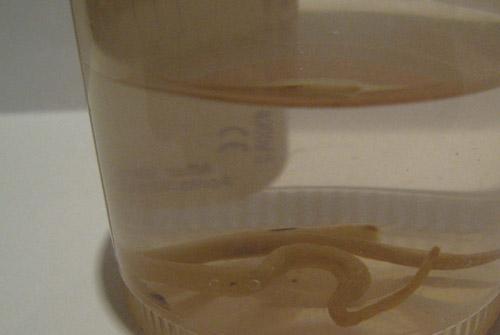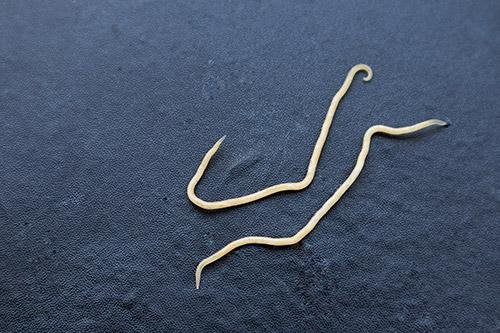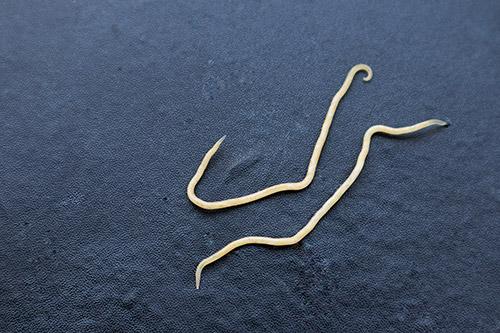How to test for a parasite
Published
Testing for parasites
- It’s best to test for the microscopic parasites Cryptosporidium and Giardia with a PCR test.
- To pick up gut worm infections, we generally use stool microscopy for eggs, cysts and parasites.
- However, the main worm infection we see in the UK is threadworm and this doesn’t require a parasite test.
- You can easily test for parasites with our Gut Bacteria, Worm and Parasite Test which combines PCR and stool microscopy.
Infection with a gut parasite is one of the potential causes for gut symptoms. But you can’t usually tell if you have a parasite infection based on symptoms alone - this is where testing for parasites comes in.
So how do you test for a parasite? How does a parasite test work and how do you take one? Before we dive into parasite testing, let’s quickly cover what the common parasites are that we see in the UK.
What are the common gut parasite infections in the UK?
Although gut parasite infections are very common worldwide, they’re actually a very rare cause of gut symptoms in the UK. The main parasite infections causing symptoms that we see in the UK are:
- Threadworms / pinworms: 20-30% of children will have these at some point
- Cryptosporidium: this is a microscopic parasite that causes gastroenteritis. There are over 4000 cases per year1 in the UK.
- Giardia: another microscopic parasite causing gastroenteritis. We see about 4000 cases per year2 in the UK.
Pretty much the only gut worm infection we see in the UK is the threadworm, also known as pinworm. It mainly affects children3, but adults can get it, too. These tiny, thread-like worms can easily be seen in stool and often cause itching around the bottom.
Other types of worm infection are incredibly rare in the UK. When they do occur, they’re only found in migrants or travellers returning from endemic areas such as the tropics and sub-tropics.
What is a parasite test?
A parasite test is a medical test used to detect the presence of parasites in the body. Parasites can live in the gut or other body parts. So, testing for parasites helps identify the exact type causing the infection. Parasite tests look for signs of parasites, like eggs, cysts, or DNA, in stool, blood, or other body fluids.
How does gut parasite testing work?
When we’re testing for parasites, we generally need to test the body fluid where the parasite lives in the body. So for gut parasites, we usually need to do a stool parasite test. There are two main types of stool parasite test. We can test for the genetic material (DNA) of a specific parasite using a PCR (polymerase chain reaction) test or we can look at stool under a microscope to look for signs of a parasite. The pros and cons of each type of test are summarised in table 1.
| Parasite Test | Pros | Cons |
| PCR |
|
|
| Stool Microscopy |
|
|
PCR test for parasites
Polymerase chain reaction (PCR) is a type of test that can pick up tiny amounts of DNA belonging to a parasite or other organism. You might remember that PCR tests are one of the main ways to pick up coronavirus for example.
PCR tests for parasites are very sensitive, meaning that they can pick up a parasite infection even when the numbers of parasites are very low. However, one of the draw-backs of PCR tests is that they are specific to the organism you want to find. For example, we can do a PCR test for the microscopic parasites Giardia or Cryptosporidium but it will only give a positive result if one of these organisms is present.
Stool microscopy for ova, cysts and parasites
When a parasite infects the gut, it will typically shed eggs (ova) or cysts (hard shells protecting some parasites at certain stages in their life-cyles). We can look for these eggs and cysts under a microscope and often identify the parasite that produced them. In the case of microscopic parasites, such as Giardia and Cryptosporidium, sometimes the parasite itself can also be seen in the stool with a microscope.
Stool microscopy has the benefit that it will pick up any eggs, cysts or parasites present in the stool - it’s not specific to an organism like PCR.
However, parasites don't shed eggs and cysts continuously and if they’re not present in the stool then you can get a “false negative” result (the parasite is there but nothing was seen on microscopy). For this reason, if a parasite infection is strongly suspected based on a person’s clinical history, it’s often recommended to repeat stool microscopy three times on three separate stool samples4.
It’s important to note that stool microscopy isn't the best way to find threadworms. That's because their eggs are usually not in the stool. Instead, the eggs are found around the anal area. But, as we’ll go into below, you don’t generally need to take a test for threadworms anyway.
When should you get a parasite test?
As we’ve mentioned, parasite infections are actually a very rare cause of gut symptoms in the UK. The only common worm infection we see is threadworm and this doesn’t cause gut symptoms. If you see these thread-like worms in your stool you don’t need to take a parasite test - you just treat them with mebendazole which is available at your local pharmacy.
The main time you should consider testing for parasites is if you have long-standing gut symptoms without a known cause. Most cases of Giardia and Cryptosporidium get better on their own but sometimes they can cause chronic gut symptoms. It’s particularly important to consider testing for parasites if you’ve spent a significant amount of time abroad in the tropics or subtropics.
I can see a “worm” in my stool - do I need to take a parasite test?
As we’ve said, the only worm infection we really see in the UK is threadworm and if you see these worms, you don’t need a test, you just take the over-the-counter medication mebendazole to treat them.
If you think you’ve seen a worm other than threadworm in your stool, chances are that you haven’t! It’s extremely common for people to mistake vegetable matter, mucus and parts of the intestinal lining for “worms”. They can look very convincing. But unless you’ve spent a significant amount of time in parts of the world where roundworm, hookworm and tapeworm are common, you will not have an infection with one of these. You can send your stool for microscopy but don’t be surprised when the results come back negative.

How to check yourself for a parasite
Some parasites, like Giardia and Cryptosporidium, are too small to see with the naked eye so the only way to check yourself for these parasites is to be aware of symptoms:
- Diarrhoea - often watery
- Nausea
- Weight Loss
- Bloating, Gas, Flatulence - common in Giardia infection
- Foul smelling stools
- Fever
- Rashes - Giardia can cause hives
- Fatigue
- Stomach pain
- Bloody stools
However, these symptoms are common to lots of gut conditions so the only way to know for sure is to take a parasite test.

Another way to check for parasites is by inspecting your stool. The only worms you’ll see in the UK are threadworms which are thin, white worms about 10mm long. Threadworm commonly causes itching of the bottom, particularly at night. So if you or your child have this symptom it’s worth having a look at your stool to see if you can see them.
How does parasite testing work with Selph?
Testing for gut parasites and other gut infections is often not something you want to bother your GP with so we’ve made it easy to test for parasites yourself.
Our Gut Bacteria, Worm and Parasite Test is a simple stool test you can take at home and send to our fully accredited NHS-testing lab for analysis. We’ll perform PCR tests for the commonest microscopic parasites Giardia and Cryptosporidium and well as some common bacterial gut infections. For completeness, we’ll also look at your stool under a microscope for parasite eggs and cysts.
Here's a quick look at how the parasite testing process works with Selph:
-
Order your Gut Bacteria, Worm and Parasite Test (free next-day delivery).
-
Activate your parasite test kit online to get started.
-
Collect your stool sample and send it back to our lab.
-
Get your results and doctor’s report within 6 days after we receive your sample.
Find out if you have a parasite with our gut bacteria, worm and parasite test.
Get tips on better health
Sign up to our emails on the better way to better health.
We'll keep you up-to-date with the latest research, expert articles and new ways to get more years of better health.






